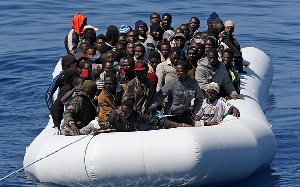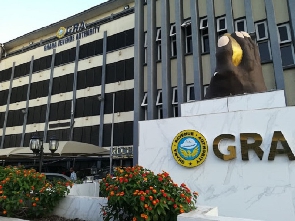Ever since human beings were created, they moved from one land to another. In most cases, they travelled to other lands in search of food, water, and shelter.
Sometimes conflict or war was another reason people were forced to leave their land and search for a new home. Often, however, they leave hardship behind only to find more difficulty ahead.
International migration is now high on national, regional and global policy agendas. Recent years have also seen an emerging international consensus on the positive aspects of labour migration regarding its linkages with development in countries of origin, benefits for destination countries and migrant workers themselves.
According to the International Labour Organization (ILO) 2018 report, migrant workers are estimated to be around 164 million, a rise of 9 percent since 2013. Ghana has her share of international migrants, the majority of who are from ECOWAS states.
The COVID-19 pandemic has brought another dimension to the discourse of international migration. The pandemic has spread worldwide without acknowledging borders. The wide-ranging and deeply-felt upheaval of the pandemic has tremendously affected many people worldwide, including migrants.
But in addition to these disruptions to daily life, the pandemic could be fundamentally changing the face of global migration. Not everyone wants to leave home, of course, but many see migration as at least one future pathway, whether it be permanently or temporarily with the hopes to one day return home.
In many ways, the global economy relies on people making decisions to migrate. Migration has remained a significant political and humanitarian issue during the COVID-19 pandemic.
Migration cooperation between European and African countries has been criticized for being conditionality-laden and dominated by a European agenda and funds, often ignoring the perspectives of African countries.
COVID-19 however, provides an opportunity to reflect on how migration cooperation can better take into account the interests and priorities of African countries and their citizens.
The Contributions of Migrant Workers in tackling COVID-19 crisis
The significant impact of COVID-19 on migrant workers and refugees, notwithstanding, the pandemic has shown the immense contribution these groups make to their societies. Millions of migrants and refugees are at the frontline of the response or play a critical role as essential workers, particularly in the health sector.
These migrant and refugee workers form a significant percentage of health workers involved in the COVID-19 response in developed countries. Data from over 80 WHO Member States indicates over a quarter of doctors and a third of dentists and pharmacists are foreign-trained or foreign-born.
About one in eight of all nurses globally are practicing in a country different from where they were born. These migrant and refugee workers form a significant percentage of health workers involved in the COVID-19 response in developed countries.
It was therefore not a coincidence that several developed countries accelerated the accreditation of refugee and migrant health workers so that they can contribute to the COVID-19 fight.
Change of Attitude towards Migrant Workers
The issue of migration has been politicized for decades. Millions of migrants who help unleash the full potential of developed economies often find themselves stuck in the middle of politics. The pessimism of international migration characterized the pre- COVID-19 political climate.
Fast word to COVID-19 and a new change trend has emerged. Public sentiment towards migration is changing as Europe and other developed countries 'clap' for essential workers which include migrants who work as doctors, nurses and caregivers, among other essential jobs.
But it remains to be seen if this newfound appreciation will remain when vaccines for Covid-19 are made available. In as much as we see the positives from it, we must also be guided by experiences from the Global Economic Recession of 2008.
Several instances of attacks on migrants were reported from developed countries after the 2008 crisis, which led to the tightening of migration policies. With the effect of the Covid-19 more widespread than the Global Economic Recession, a critical question and concern need to be answered.
Are we going to see a repeat of the attack on migrants? Not to be seen as a prophet of doom but with a high level of unemployment due to the effect of the Covid-19 pandemic, there is the possibility of a new wave of xenophobia in several countries if proper measures are not taken now.
Policy Direction
As we applaud the critical role migrants’ play in this COVID-19 pandemic, critics' lenses will focus on Africa regional blocks and how they manage their migration policies.
For example, movement restrictions and borders throughout the ECOWAS region from March -2020 and onward affected millions of migrant workers. How will African treat their fellow migrants (who are mostly in the informal sector) with most borders now opened?
It is now more crucial than ever for all regional blocks in Africa to recognize the fundamental contribution of migrants to the region's economic and social life. It is now visibly vital for proper and practicable integration policies to be formulated to harness the skills of some of the return immigrants who wouldn’t want to travel outside again.
Migration cooperation in a post-COVID-19 setting may see some –positive and negative –changes as states focus on economic recovery On the one hand, the pandemic may change the perception of essential migrant workers, particularly in developed countries, thus increasing the need to positively discourse migration.
However, on the other side, in a bid to protect domestic jobs, these developed countries may be a bit more reluctant to accept migrants. Based on post crises experience, the COVID-19 economic downturn is likely to affect both migrants and nationals negatively.
Migrants, who are particularly prone to stigmatization, should be adequately protected from xenophobia and discrimination in the employment and social spheres.
As we observe International Migrants Day, the wish of this writer is that the world ensures human mobility remains safe. As we hope for a better and improved economy in the coming year for Ghana, the country will likely need to deal increasingly with immigration and the return of its nationals by integrating them and using their skills for economic recovery.
Opinions of Monday, 21 December 2020
Columnist: Pearlvis Atsu Kuadey















